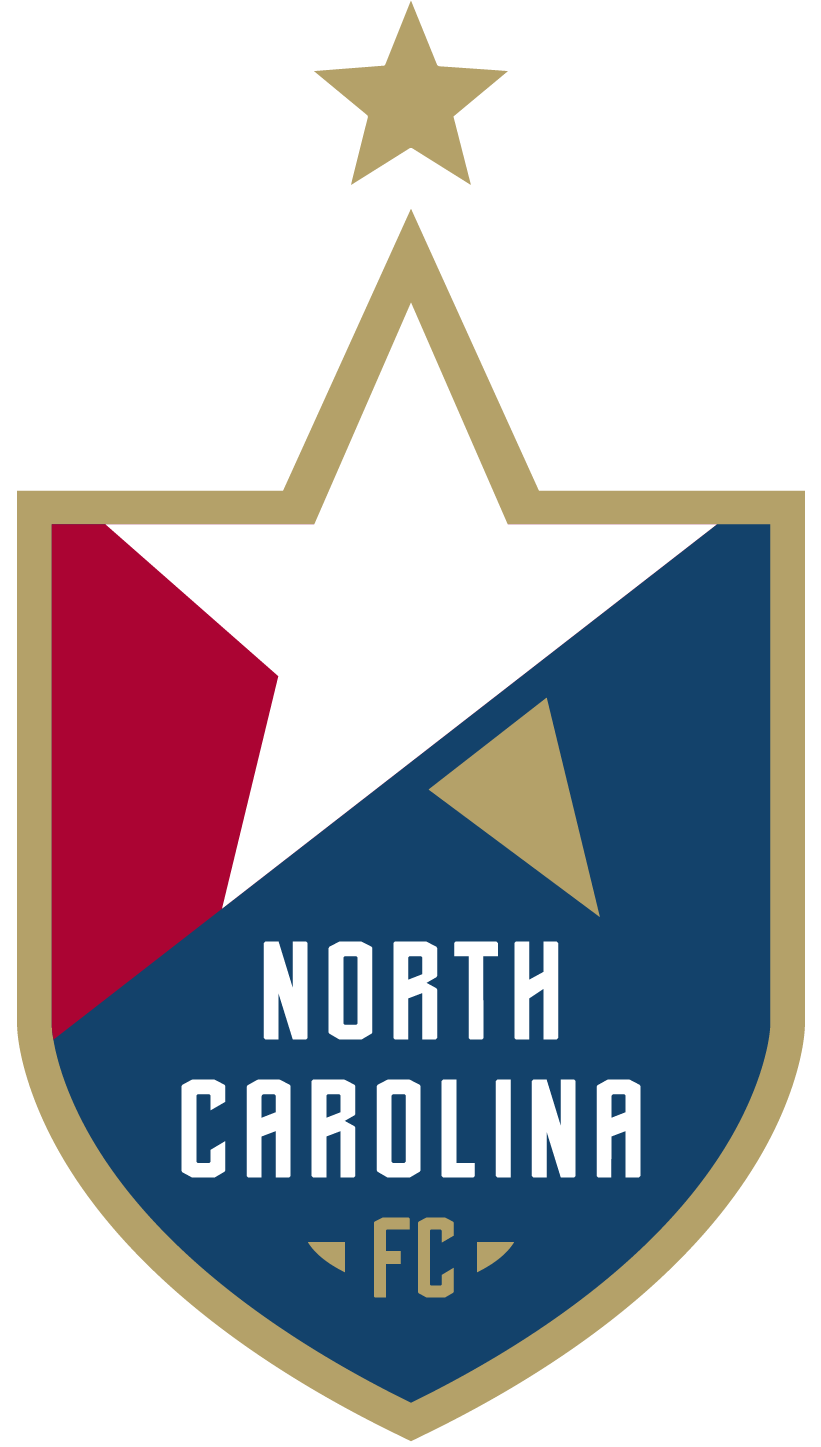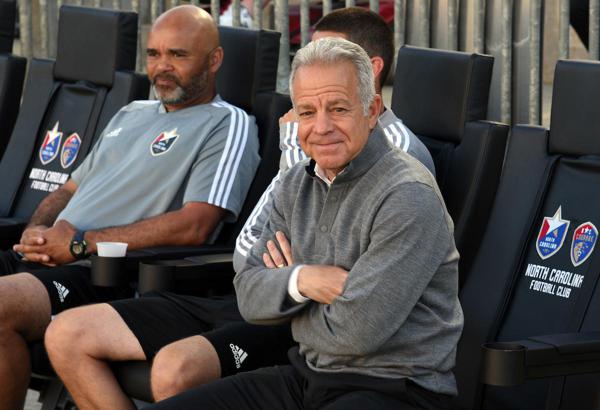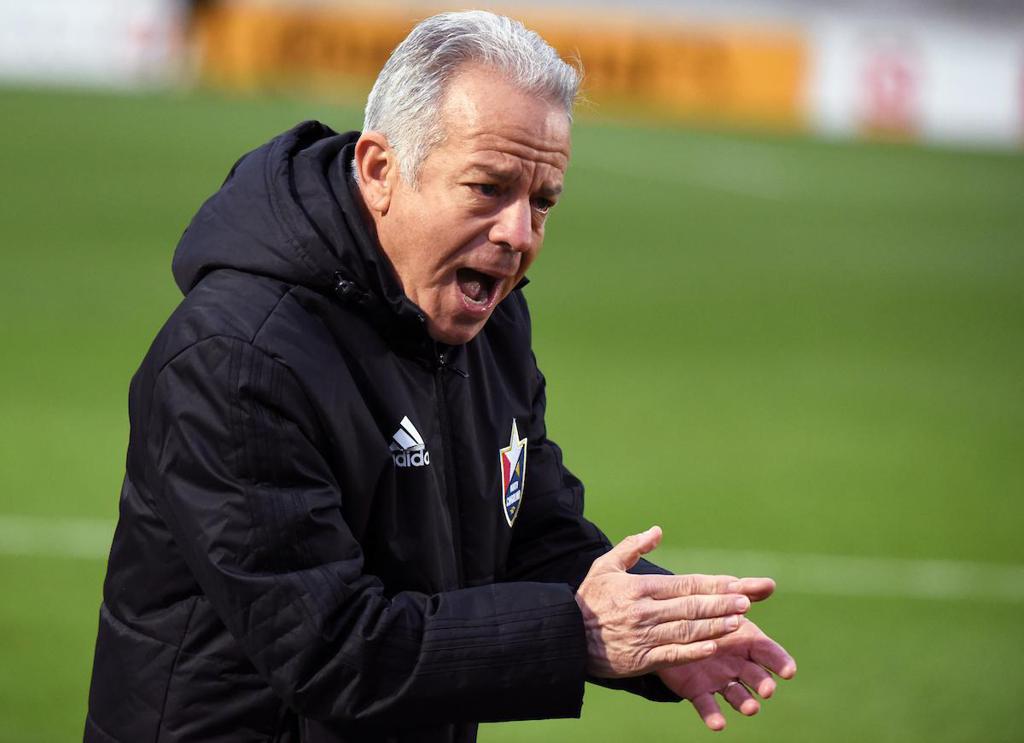
Last December, a new era at North Carolina Football Club began when Dave Sarachan was named the fourth head coach in North Carolina FC history. A seasoned veteran in the coaching world, Sarachan had most recently served as the U.S. Men’s National Team head coach and entered his new role at NCFC with a reputation as a great developer of young talent at his previous stops, including the LA Galaxy and Chicago Fire.
In his first season with the club, NCFC posted the second-highest regular-season win total in team history, going 16W-10L-8D to finish seventh in the Eastern Conference and qualify for the USL Championship Playoffs. In doing so, Sarachan’s group lost only once at Sahlen’s Stadium at WakeMed Soccer Park during the regular season and reached the fourth round of the Lamar Hunt U.S. Open Cup.
We caught up with Sarachan to get his feelings on how his first year with the club went.
Going into the season, what sort of expectations did you have for your team and what are your thoughts on how things ultimately played out?
DS: It started, for me, with a clean slate on many levels – like all new positions. It didn't take me long to understand the DNA of this group, and by that I mean this was a group that from day one was very open to improvement. We had a vision to accomplish some things as a group, as a soccer-playing team, in terms of being hard to play against and being a collective team defensively, to have freedom in the attacking third and several other components. I think from the very beginning this was a group that was very open to being better individually and collectively. As I got to know them from the very beginning and as weeks and months and days went by, it was an enjoyable group to work with from that aspect. I didn't know what to expect as far as how we would look when we had the ball and how dangerous we would be going forward – and the same on the defending end. But I think as we built this roster and we got through the year, they showed their character.
I think we did hit a stretch – like most teams do – where we had a little bit of a tough September. But overall, I thought this team was a little bit deeper than I expected it would be. When guys were injured, other guys stepped up. I thought we maintained a good level for our young team. I think our average age was 23. The learning curve was steep, and yet we came through it pretty well with a young team. There were a lot of pleasant surprises for me, personally, with the group. All in all, as I look back on it, we accomplished a lot with the group that we had. Still disappointed that we couldn't go further because we had the ability to do that, but a lot of learning will come from that as well.
Last December, a new era at North Carolina Football Club began when Dave Sarachan was named the fourth head coach in North Carolina FC history. A seasoned veteran in the coaching world, Sarachan had most recently served as the U.S. Men’s National Team head coach and entered his new role at NCFC with a reputation as a great developer of young talent at his previous stops, including the LA Galaxy and Chicago Fire.
In his first season with the club, NCFC posted the second-highest regular-season win total in team history, going 16W-10L-8D to finish seventh in the Eastern Conference and qualify for the USL Championship Playoffs. In doing so, Sarachan’s group lost only once at Sahlen’s Stadium at WakeMed Soccer Park during the regular season and reached the fourth round of the Lamar Hunt U.S. Open Cup.
We caught up with Sarachan to get his feelings on how his first year with the club went.
Going into the season, what sort of expectations did you have for your team and what are your thoughts on how things ultimately played out?
DS: It started, for me, with a clean slate on many levels – like all new positions. It didn’t take me long to understand the DNA of this group, and by that I mean this was a group that from day one was very open to improvement. We had a vision to accomplish some things as a group, as a soccer-playing team, in terms of being hard to play against and being a collective team defensively, to have freedom in the attacking third and several other components. I think from the very beginning this was a group that was very open to being better individually and collectively. As I got to know them from the very beginning and as weeks and months and days went by, it was an enjoyable group to work with from that aspect. I didn’t know what to expect as far as how we would look when we had the ball and how dangerous we would be going forward – and the same on the defending end. But I think as we built this roster and we got through the year, they showed their character.
I think we did hit a stretch – like most teams do – where we had a little bit of a tough September. But overall, I thought this team was a little bit deeper than I expected it would be. When guys were injured, other guys stepped up. I thought we maintained a good level for our young team. I think our average age was 23. The learning curve was steep, and yet we came through it pretty well with a young team. There were a lot of pleasant surprises for me, personally, with the group. All in all, as I look back on it, we accomplished a lot with the group that we had. Still disappointed that we couldn’t go further because we had the ability to do that, but a lot of learning will come from that as well.
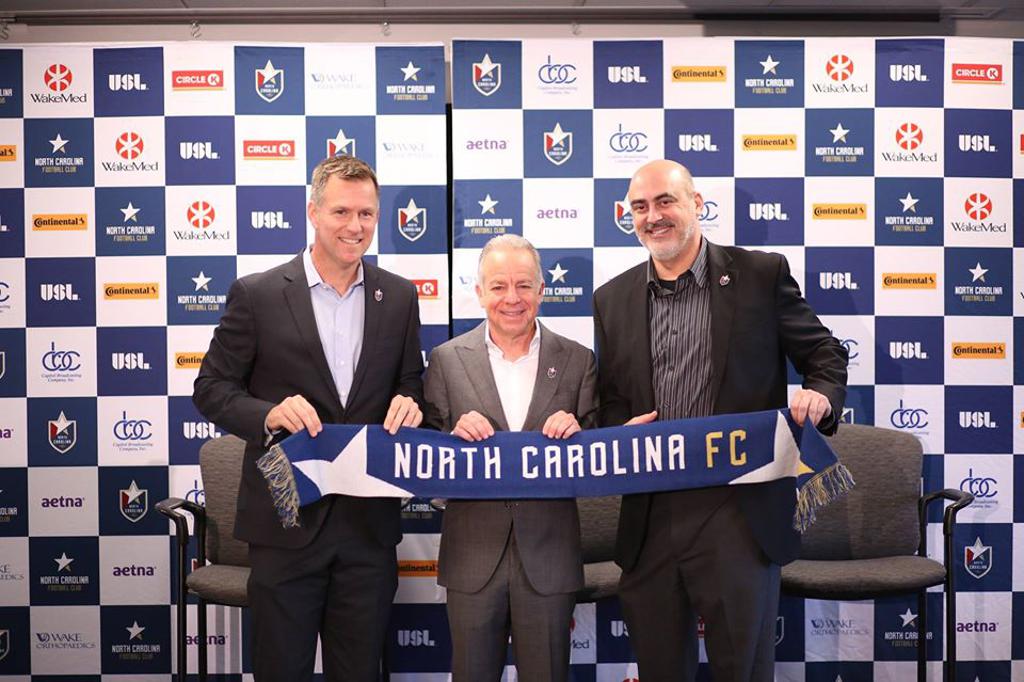
One of the biggest highlights of the season was your team’s home form. NCFC posted the third-highest home point total (38) in the USL Championship this season. What do you attribute that to?
DS: Having only lost to Indy in the regular season, one game at home, we took pride in that. I think coming into the season, just by odds, I wouldn't have expected that we would be quite that dominant. You ask any coach around the world, you expect three points at home. That's just sort of established in our sport. To be able to be consistent and do it is a different story. I think our guys truly embraced that element, which is important. Playing at WakeMed is still as good as any surface in the country in terms of trying to play the kind of soccer we want to play. It was always enjoyable for our guys to be able to get on the field and play on a surface like that. You know, the Oak City Supporters, we had their support, and I think it was all of that. Just being able to take it to another level at home … it was very pleasing.
You had a very young team in terms of the makeup of the squad, with players who started the season aged 25 or younger combining to play 23,281 minutes. Was it enjoyable for you to see such a young group make the sort of progress it did?
DS: It was fun because people forget – I forget – that as a young pro, a guy like Alex Comsia coming from a college environment or even Sam (Brotherton) … when you step on the field in February and finish in November, it's a long season. It's the most soccer that a lot of these young guys have played consistently in terms of weeks and months. So, there's always a time during the year usually where they hit a wall. All of them did to a certain extent, but the dropoff wasn't dramatic. It was fun for me. I enjoyed the teaching element and the way they absorbed information and just wanted to get better each and every day and each and every game. As a coach, you manage personalities, but you have to coach, too. For me, I did enjoy that part, and I was a little surprised in a good way with a young group like that where they found a way in certain games to hang in there, because we played a lot of challenging teams and guys with good experience. But it's a credit to them, because they had an individual mindset but also a collective mindset.
One of the biggest highlights of the season was your team’s home form. NCFC posted the third-highest home point total (38) in the USL Championship this season. What do you attribute that to?
DS: Having only lost to Indy in the regular season, one game at home, we took pride in that. I think coming into the season, just by odds, I wouldn’t have expected that we would be quite that dominant. You ask any coach around the world, you expect three points at home. That’s just sort of established in our sport. To be able to be consistent and do it is a different story. I think our guys truly embraced that element, which is important. Playing at WakeMed is still as good as any surface in the country in terms of trying to play the kind of soccer we want to play. It was always enjoyable for our guys to be able to get on the field and play on a surface like that. You know, the Oak City Supporters, we had their support, and I think it was all of that. Just being able to take it to another level at home … it was very pleasing.
You had a very young team in terms of the makeup of the squad, with players who started the season aged 25 or younger combining to play 23,281 minutes. Was it enjoyable for you to see such a young group make the sort of progress it did?
DS: It was fun because people forget – I forget – that as a young pro, a guy like Alex Comsia coming from a college environment or even Sam (Brotherton) … when you step on the field in February and finish in November, it’s a long season. It’s the most soccer that a lot of these young guys have played consistently in terms of weeks and months. So, there’s always a time during the year usually where they hit a wall. All of them did to a certain extent, but the dropoff wasn’t dramatic. It was fun for me. I enjoyed the teaching element and the way they absorbed information and just wanted to get better each and every day and each and every game. As a coach, you manage personalities, but you have to coach, too. For me, I did enjoy that part, and I was a little surprised in a good way with a young group like that where they found a way in certain games to hang in there, because we played a lot of challenging teams and guys with good experience. But it’s a credit to them, because they had an individual mindset but also a collective mindset.
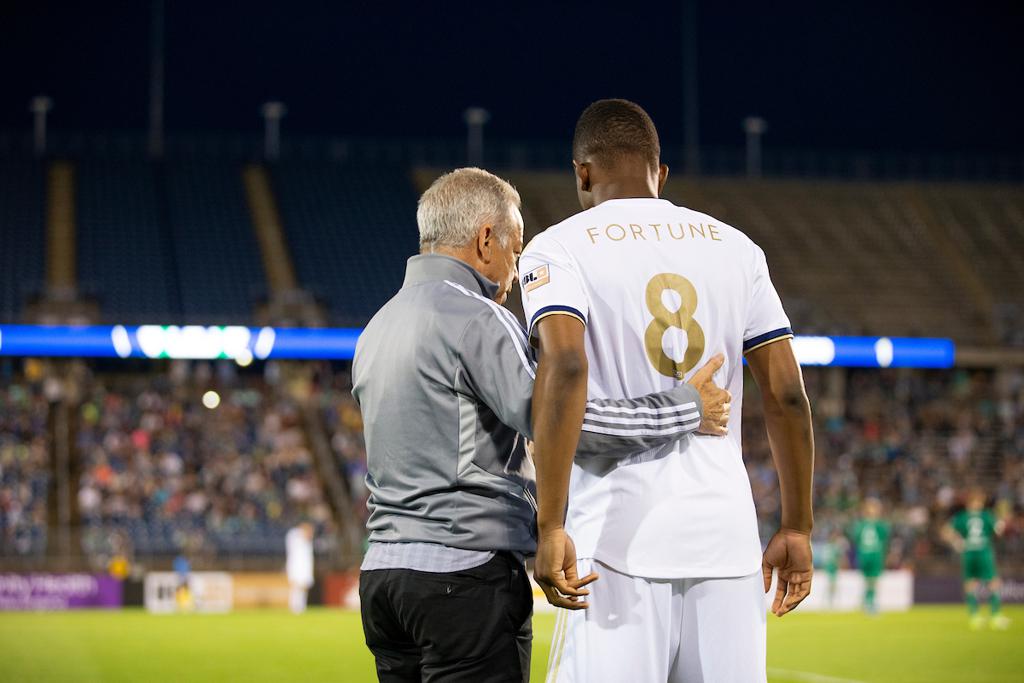
This past season, NCFC allowed just 1.09 goals per match, a considerable improvement from 2018 (1.47). Goalkeeper Alex Tambakis played a big role in that, as he earned Team MVP honors. What stands out about Alex?
DS: First and foremost, he loves to work. He's got a real desire every day to put in the work that's required. It's a hard job. Number one, he's got a great work ethic. He's open to teaching and coaching, and he knows that as good as he is, there's room to be better. Right away, that's a good starting point. As far as the technical aspect, the stats kind of bear that out. He faced a lot and stopped a lot of shots. I think his hands are good, his movement is good. His distribution is improving; I think that's an area that will continue to improve. At this stage of his career, he's become more of a leader back there. He's still young as a goalkeeper, but he's still got a little bit of a veteran presence now. I think even from the year prior when I watched tape, this year he seemed a little less antsy, a little more calm. That's good for him but also good for the players in front of him. He really checked a lot of boxes.
Obviously you have a considerable amount of experience coaching at the international level and in Major League Soccer, but this was your first year coaching in the USL Championship. What stood out to you about the league?
DS: From the starting point, just the overall level of play. It certainly varied from franchise to franchise: some teams were more experienced, some focused on development and played a lot of young guys. But on the whole, one of the surprising things was the level being a little bit better in a technical sense and a tactical sense than I maybe thought it would be. I think the different challenges of venues where you play … once you experience it, it gives you even more of a sense of the challenge of playing on a smaller field versus a regulation field or a turf field versus a baseball field. Generally, the professionalism and the level of the league was maybe a little bit better than I would have first thought coming in. That's a real positive in my mind.
This past season, NCFC allowed just 1.09 goals per match, a considerable improvement from 2018 (1.47). Goalkeeper Alex Tambakis played a big role in that, as he earned Team MVP honors. What stands out about Alex?
DS: First and foremost, he loves to work. He’s got a real desire every day to put in the work that’s required. It’s a hard job. Number one, he’s got a great work ethic. He’s open to teaching and coaching, and he knows that as good as he is, there’s room to be better. Right away, that’s a good starting point. As far as the technical aspect, the stats kind of bear that out. He faced a lot and stopped a lot of shots. I think his hands are good, his movement is good. His distribution is improving; I think that’s an area that will continue to improve. At this stage of his career, he’s become more of a leader back there. He’s still young as a goalkeeper, but he’s still got a little bit of a veteran presence now. I think even from the year prior when I watched tape, this year he seemed a little less antsy, a little more calm. That’s good for him but also good for the players in front of him. He really checked a lot of boxes.
Obviously you have a considerable amount of experience coaching at the international level and in Major League Soccer, but this was your first year coaching in the USL Championship. What stood out to you about the league?
DS: From the starting point, just the overall level of play. It certainly varied from franchise to franchise: some teams were more experienced, some focused on development and played a lot of young guys. But on the whole, one of the surprising things was the level being a little bit better in a technical sense and a tactical sense than I maybe thought it would be. I think the different challenges of venues where you play … once you experience it, it gives you even more of a sense of the challenge of playing on a smaller field versus a regulation field or a turf field versus a baseball field. Generally, the professionalism and the level of the league was maybe a little bit better than I would have first thought coming in. That’s a real positive in my mind.
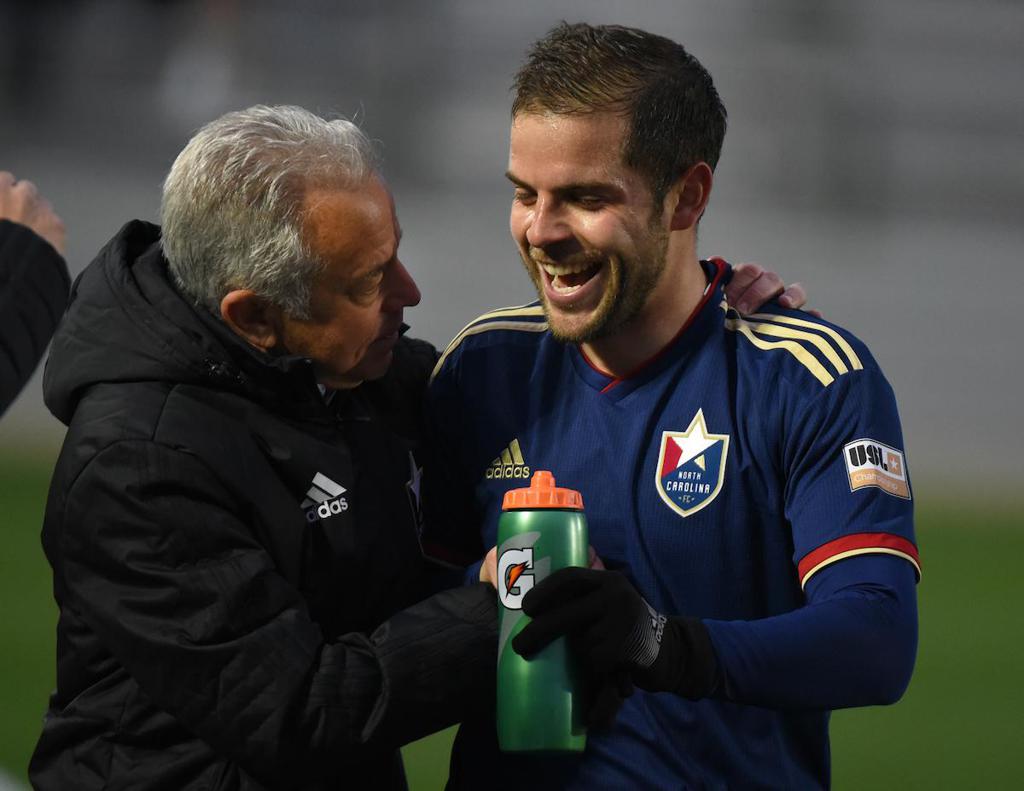
The club has announced that midfielders Steven Miller and Ben Speas will be returning for the 2020 season. How important is it to have those two guys back?
DS: Statistically, Steven had his best year and provided some important goals for us this year, along with being a guy that is really embedded with the club and the community. He’s sort of on a pathway similar to Austin da Luz and some others over the years. He really wears the crest proudly and you can never dispute his work rate over the course of 90 minutes. From start to finish, he's all in. To have a guy who has that competitive DNA is not only important for him and for the first 11, but to the entire group as well, so he's shown a lot of leadership this year and wore the captain's armband on many occasions when Austin (da Luz) wasn't available.
When we acquired Ben in the offseason, I had an idea about what I was getting and it came to fruition: a guy who is a great pro, showed up every day, utilized his experience with our younger guys and showed a lot of versatility positionally, whether we played him as a central midfielder, second forward or a wide guy. Having his soccer IQ and technical ability really helped solidify our attacking core of guys this season. Knowing we're going to have a guy like Ben next year gives us a really good starting point.
Throughout the year, your team had multiple results that stood out across the league, including a 3-1 win at previously undefeated Tampa Bay and a 5-0 victory over Pittsburgh, which would go on to finish atop the Eastern Conference table. What does that tell you about the sort of group you had and how that can be carried over into next season?
DS: It just shows me as I reflect back, we were capable and as competitive as any team in our division. There were a few teams that had more experience on the field and certainly had quality, so I'm not going to boast that we were by far the best team. But, I think as I review our year, I've come away saying we certainly made a case for being one of the tougher teams in our division. We were capable in the final third and we were hard defensively to play against. Those are great starting points, and we can hopefully keep the core of our group going into next year.
The club has announced that midfielders Steven Miller and Ben Speas will be returning for the 2020 season. How important is it to have those two guys back?
DS: Statistically, Steven had his best year and provided some important goals for us this year, along with being a guy that is really embedded with the club and the community. He’s sort of on a pathway similar to Austin da Luz and some others over the years. He really wears the crest proudly and you can never dispute his work rate over the course of 90 minutes. From start to finish, he’s all in. To have a guy who has that competitive DNA is not only important for him and for the first 11, but to the entire group as well, so he’s shown a lot of leadership this year and wore the captain’s armband on many occasions when Austin (da Luz) wasn’t available.
When we acquired Ben in the offseason, I had an idea about what I was getting and it came to fruition: a guy who is a great pro, showed up every day, utilized his experience with our younger guys and showed a lot of versatility positionally, whether we played him as a central midfielder, second forward or a wide guy. Having his soccer IQ and technical ability really helped solidify our attacking core of guys this season. Knowing we’re going to have a guy like Ben next year gives us a really good starting point.
Throughout the year, your team had multiple results that stood out across the league, including a 3-1 win at previously undefeated Tampa Bay and a 5-0 victory over Pittsburgh, which would go on to finish atop the Eastern Conference table. What does that tell you about the sort of group you had and how that can be carried over into next season?
DS: It just shows me as I reflect back, we were capable and as competitive as any team in our division. There were a few teams that had more experience on the field and certainly had quality, so I’m not going to boast that we were by far the best team. But, I think as I review our year, I’ve come away saying we certainly made a case for being one of the tougher teams in our division. We were capable in the final third and we were hard defensively to play against. Those are great starting points, and we can hopefully keep the core of our group going into next year.
Season tickets for North Carolina FC’s 2020 season are on sale now. Click here to learn more about season tickets or call the Coastal Credit Union Box Office at 919-459-8144 to speak with a ticket representative.
Season tickets for North Carolina FC’s 2020 season are on sale now. Click here to learn more about season tickets or call the Coastal Credit Union Box Office at 919-459-8144 to speak with a ticket representative.































































































































































































































































































